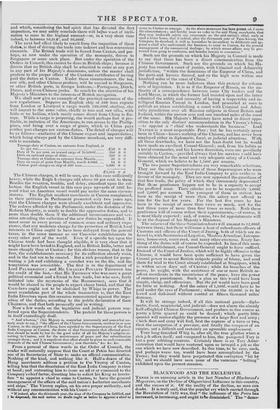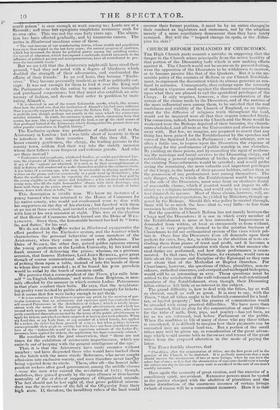BLACKWOOD AND THE EXCLUSIVES.
THERE is an amusing article in the last Number of Blackwood's Magazine, on the Decline of Oligarchical Influence in this country, and the causes of it. Of the reality of the decline, no man can doubt. It is truly said, that the popular cry which carried through the Revolution of 1832 was, that " the influence of the Peers has increased, is increasing, and ought tote diminished." The "demo-
crane poison" is sure enough at work among us; Lords are at a ffiscount ; and nbne but egregious simpletons reverence rank for its own sake. This was not the case forty years ago. The altera- tion has been effected gradually, and by numerous causes. The writer in Blackwood mentions some of these.
" The vast increase of our manfacturing towns, whose wealth and population have mcre than tripled in the last forty years; the natural progress of opulence, which has increased the desire for political power among the middling ranks; the spread of education, which has exposed a multitude, tenfold increased, to the influence of political passion and misrepresentation, have all contributed to pro- duce the lamentable result."
But we are told that the Aristocracy might still have stood their ground, " had they not acted with a degree of blindness which doubled the strength of' their adversaries, and confounded the efforts of their friends." In an evil hour, they became "Exclu- sives." They became personally insolent, as well as politically cor- rupt. It was not enough for them to lord it over the King and the Parliament—to rule the nation by means of rotten boroughs and purchased corporators; but they must also establish an aris- tocracy of fashion, and devote their order to perdition by insti- tuting Almack's.
" It is observed in one of the recent fashionable novels, which, like straws, show how the wind sets, that the institution of Alinack's has had more influence than is generally supposed in bringing about the Reform Bill. The observation is perfectly just, though perhaps not exactly in the sense which the aristocratic novelist intended. In truth, the exclusive system, which, emanating from that centre, has now, like a leprosy, overspread the land, is one If the chief causes of that profound hatred of the Aristocracy which distinguishes the present from any other popular convulsion in English history."
The Exclusive system was productive of sufficient evil to the Aristocracy in London ; but it was little short of insanity in them to introduce it into their counties. But this they did. The lesser country gentlemen, the clergy, the leading persons in the county town, seldom find their way into the stately mansion where their fathers were frequent and welcome guests. And who are there instead ?
" Foxbunters and sycophants, whiskered dandies, or scarlet-pantalooned hus- sars, the elegantes of Almack's, and the loungers of Sit. James's Street clubs. If ary of the natives' are admitted, it is such as by their accomplishments or skill in flattery will condescend to make themselves useful to the exclusive circle. A few ladies of a certain age, who may be serviceable in playing quadrilles or waltzes on the piano, and can occasionally at a push stand up themselves ; who flatter the mothers and aunts by repeating the compliments they hear paid by the young eligibles to their nieces and daughters ; a few talented and travelled young men, who fill the right lionourables' albums with their drawings, sing duets with them at the piano, attend them in their rides in default of better beaux, dance with them at balls," &e.
This description is vividly true. We know an instance of a young baronet who was returned to the House of Commons for his native county, who would not condescend even to dine with his supporters on the day of his election; but lunched with them at an inn at three o'clock, and invited a select tonnish party to dine with him at his own mansion at eight. This was at the election
of that House of Commons which turned out the Duke of WEL- LINGTON. Since then, the honourable baronet has had to " lawn, lie, and flatter," for his seat. We do not think thatifthe writer in Blackwood exaggerates the effect produced by the Exclusive system, and the hauteur which characterizes the personal behaviour of' some members of the Aristocracy, when they come in contact with plebeians. The Duke of SUSSEX, the other day, gained golden opinions among the young gentlemen at the London University, by his kind and frank manner of delivering the prizes; whereas, on a previous occasion, that famous Reformer, Lord JOHN RUSSELL, gave great though of course unintentional offence, by his supercilious mode of putting them upon a table, instead of into the hands of those to whom they were awarded ; as if he feared his pare porcelain would be soiled by the touch of common earth.
We perceive that a correspondent of the Times., who calls him- self " an English Gentleman," and writes from Brighton, is mor- tally offended by the manner in which certain Ladies Patronesses in that place conduct their balls. He says, that the neighbour- ing gentry were invited by public advertisement toapply for tickets; but it seems that few were lucky enough to get them.
" It is too notorious at Brighton to require any proof, by the mention of par- ticular instances, that an aristocratic and exclusive spirit has controlled these self. created Patronesses in the distribution of tickets ; which is totally Mom sistent with the terms of the foregoing public advertisement, and which leis treated with wanton insult a number of most respectable gentry, who have justly considered themselvese invited by the terms of' the public advertisement to apply for tickets, and who have been surprised at having met with refusals. When my Lord this or my Lady that, or any member of a titled f unily, has applied for a ticket, the ticket has been granted of moire; but when gentry, however unexceptionable their grade in society, but wlm have not been considered mem- bers of the fashionable world' in the capricious estimate of the Ladies Pa. tronesses, have implied for tickets, the application has been commonly refused."
He concludes with the just observation, that " these are not times for the exhibition of aristocratic impertinences, which are entirely out of keeping with the general intelligence of the age." Thus it is that the Aristocracy have made enemies without number ; Ind have disgusted those who would have backed them in the bahle with the more sturdy Reformers, who never sought admission into exclusive society, and were therefore never hurt:by being rejected from its circle. These, after all—the honest inde- pendent seekers after good government, among the middle classes —were the men who carried the revolution of l832 ; though, doubtless, they gained greatly by the open alliance or treacherous neutrality of the ci-devalt supporters of Oligarchical misrule. The fact should not be lost sight of, that gross political miscon- duct was the main cause of the fall of the Oligarchy from their high state. If, therefore, the hereditary rulers of the laud would recover their former position, it must be by an entire changefin their conduct as legislators and statesmen, not by the adoption merely of a more conciliatory demeanour than they have lately assumed. But will the "leopard change its spots, or the 'Ethio- pian his skin?"























 Previous page
Previous page